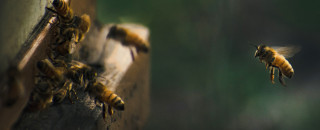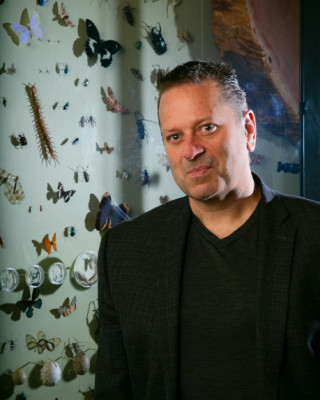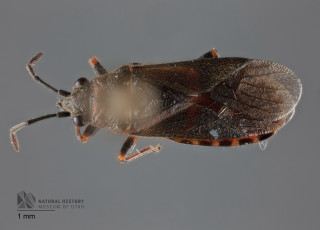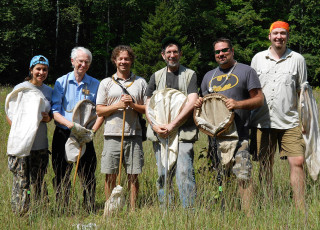A World Without Bugs
By Jason Cryan
Everyone seems to be talking about bugs, and the buzz isn’t nice. We’ve heard about the Wasatch Front’s skyrocketing mosquito population, the nuisance of elm seed and box elder bugs and even the National Weather Service’s mistaken claim of seeing a swarm of grasshoppers headed to Utah on radar.
Insects have an image problem, and I’m here to help change that.
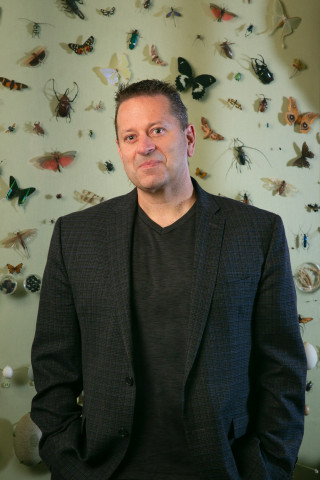
Jason Cryan, the Sarah B. George Executive Director of the Natural History Museum of Utah. © Mark Johnston | NHMU
Why do I care so much about bugs? I’m a nature enthusiast and a scientist – I’m an entomologist (a scientist that studies insects) and my research focuses on the diversity and evolution of some truly charismatic tropical insects, including treehoppers, lanternflies and spittlebugs. I’m also the executive director of the Natural History Museum of Utah – a world-class museum of natural and cultural history in Salt Lake. Biodiversity conservation is one of NHMU’s scientific priorities.
I’m often asked, “What good are bugs?”Let’s take a moment to imagine a world without bugs. It wouldn’t be nearly as great as you think. Here’s why:
We’d have very little food.
Each year, insects pollinate billions of dollars of fruit, vegetable and nut crops in North America alone. We know honeybees are important insect pollinators, but they are only one of thousands of pollinating insect species – bees, wasps, butterflies, moths, beetles and flies – each necessary for the reproduction of more than 85% of the world’s flowering plants. Without insect pollinators, flowering plants – and the foods they produce – would disappear.
Invertebrates are important and popular worldwide delicacies, like crabs, lobsters, shrimp, clams and mussels. Insects, while not commonly eaten in the United States, are dietary staples in other societies around the world and have been for thousands of years. They are excellent sources of protein, good fats and essential vitamins.
Insect products – like honey – are globally important foods. The loss of these invertebrate foods would be devastating to human populations everywhere.
We’d lose many of our favorite home and beauty products.
Insects produce substances used by humans in an impressive variety of products, including waxes, lotions, cosmetics, dyes, polishes, varnishes and inks. Without invertebrates, your prized silk clothing and bedsheets would be impossible; shellacs and many colored dyes would be gone; and the best waxes used to make candles and in waterproofing textiles would no longer exist.
We’d see scientific and medical research stall.
Insects and other invertebrates have been used in traditional medicines for thousands of years, and many are essential in modern scientific and medical research. Some, like fruit flies, serve as model organisms in genetic research, while others (e.g. horseshoe crabs) are used in medical testing.
Much of our current understanding of genetics as related to health, medicine and pharmaceuticals stems directly from work with “bugs.” Without insects, human health would be severely and negatively impacted.
A world without bugs would mean fewer foods to eat, products to use and a huge decrease in scientific and medical discovery. It is not an overstatement to say that many aspects of human life would simply cease if insects disappeared from the planet.
Disturbingly, researchers have documented a global decline in insects over the past several decades. Results of insect surveys suggest that 40 percent or more of insect species may be under threat of extinction in the coming years, largely due to habitat loss, increased use of chemical pesticides and fertilizers and the changing climate.
Anecdotally, it’s common to hear people say that they can drive for miles and miles and not get any “bug splats” on their windshield anymore. This insect biodiversity crisis is far more concerning when one realizes that insects are essential components of ecosystem – and human – health.
Insects and other invertebrates affect our lives and our environment in fundamentally important and positive ways; they are vital to life on earth and our fragile planet itself.
So, what can you do?
You can plant native plants and hold off on chemical pesticides and fertilizers to support insect populations – and recommend to your neighbors that they do the same. And if you see a bug where you don’t want one, simply place a cup over the bug and slide a piece of paper underneath it as a temporary trap before releasing it outside.
At the community level and even at the individual level, let’s do our best to keep insects alive because we couldn’t live without them.
This article first appeared in the Salt Lake Tribune on August 9, 2023.
Learn More
If you want to learn more about the fascinating world of entomology, then join us for the Museum's next annual BUGfest!
